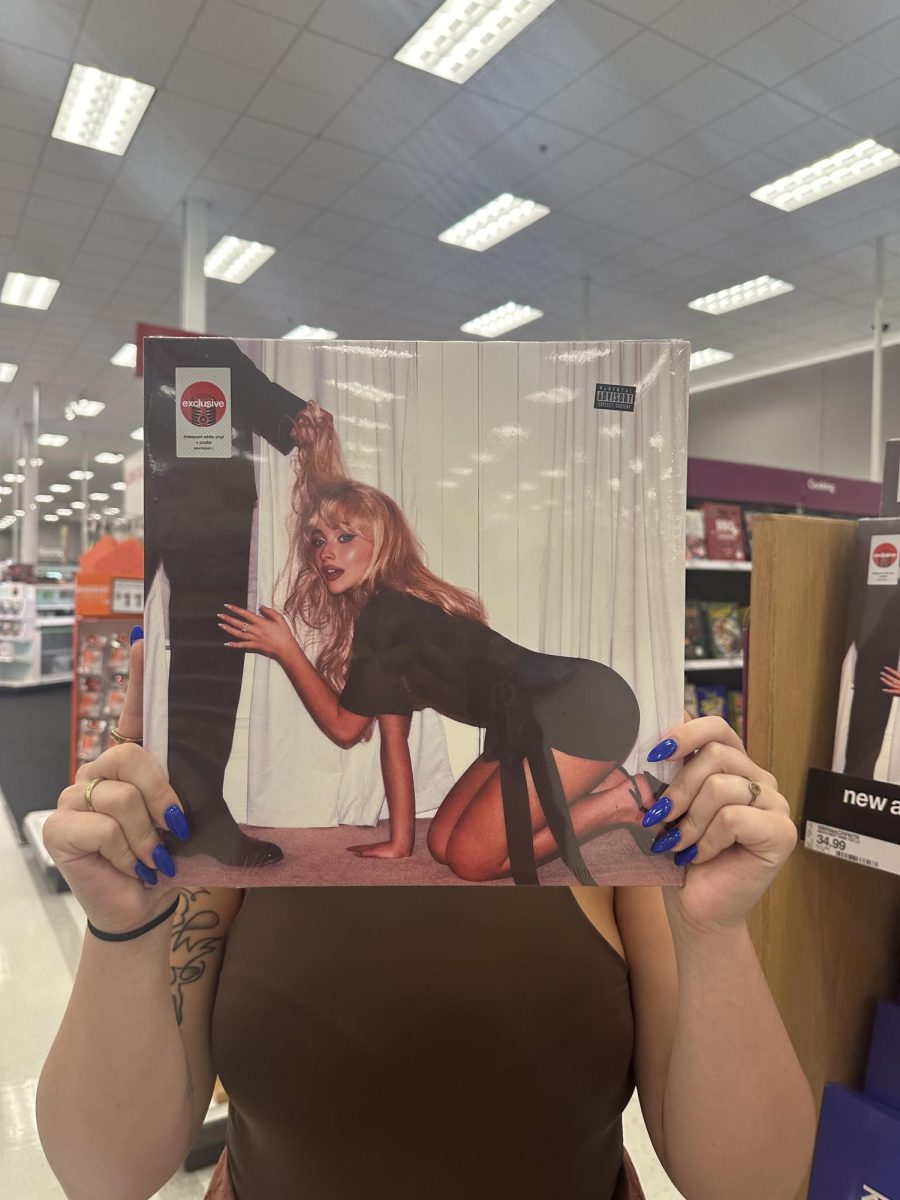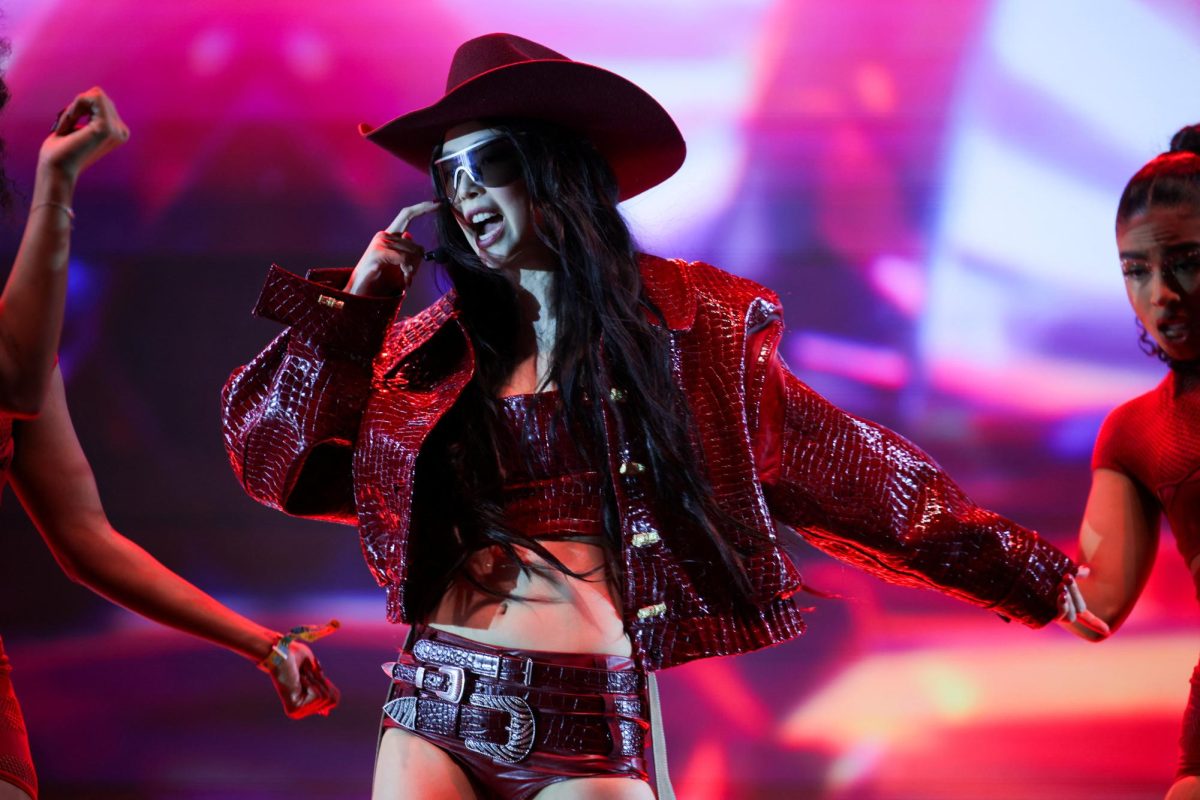In this political climate, the hands of politics have infested every part of our world. In this world, bodies, sexualities, jobs and art have all become political statements. In our world, silence is violence and many musicians have decided to utilize their art to say what needs to be shouted about the world.
Paris Paloma, is an alternative/indie singer songwriter that took the world by storm with her hit song “Labour.” Paloma’s musical talents have reached the hearts of many women with her heart wrenching and touching lyrics many women have been able to see themselves within.
She created many feminist anthems such as “As good as reason” and “Boys, bugs and men.” Paloma’s fan base quickly rose in popularity gaining 5.9 million monthly listeners on spotify.
Her hit song “Labour,” having 83.1k videos beneath the sound on TikTok where many women have taken to the app under the song to follow feminist trends that raise awareness about many struggles women face or to share their stories.
Recently Paloma released her new single “Good Boy,” and its accompanying music video starring “Hunger Games: A Ballad of Singer Birds and Snakes” star Tom Blyth, Cornelius Snow as the “good boy” in question.
This casting choice was a strategic one to say the least as Blyth got his big break by portraying the cruel and calculated Cornelius Snow in the “Hunger Games,” prequel where Snow and our female lead Lucy Grey Baird, played by Racheal Zeagler, share a complicated romance. Snow utilizes his power to manipulate and mistreat Lucy Grey Baird.
Utilizing a man who played such a hated and complex character in the lead role of this music video was a choice we cannot ignore as it causes our minds to connect the media we are witnessing.
We see Blyth on the screen portraying the “powerful” but manipulative man at the center of the video. We also see the eternally hated villain and complex character of the newest “Hunger Games” movie, a series that is inherently political, its author Suzanne Collins stating priorly that she only writes when she has something to say about the world.
Paloma made a statement connecting these pieces of media through this actor and it’s safe to say it was a powerful one.
As the song begins, the listener is quickly greeted with the voice of Paloma as she states: “I knew one day I’d have to watch powerful men burn the world down, I just didn’t expect them to be such losers.”
This bold and powerful statement sets the tone of the rest of the song, that utilizes metaphors and colorful forms of figurative language to make fun of the men of the world that become so eager to gain power, assert dominance and claim a spot as top of the food chain that their lust for power ends up becoming their own demise. The song creates colorful cuts into the toxic masculinity that has the vast majority of men on a leash.
The song, much like many others by Paloma, utilizes colorful cryptic language to draw attention to the arguably moronic choices men make as they stumble their way over anyone in their way to get their fingers on the edge of anything that resembles power. This allows us to look into a deeper picture, the societal pressure that is placed on men to dominate, to assert, to bulldoze over anyone and everyone in their way, not allowing them to forge valuable relationships with the fellow men in their lives nor the women. In a world where men are constantly in a competition with themselves and the world around them they become emotionally inept, unable to craft honest and true relationships due to the facade they have forged around themselves that forces them to view everyone and anyone as competition.
“Good Boy” by Paris Paloma exploits the ever present fact that the men of the world are just as subjugated to the patriarchy as women. The patriarchy has placed a collar on their necks, dragging them by the leash, feeding them treats of praise and power to keep them subservient under a system that they pretend serves them. In reality it places men in a kennel just as much as it does the women around them.
The world has painted a picture of the patriarchy as a system that serves the men, providing them with luxuries women have to fight for. With systemic issues being put in place to make life fundamentally harder for women such as restrictions on medical procedures like abortion bans and excess takes like the “pink tax” a tax specifically placed on products marketed to women.
While men have been gifted many privileges women do not have, the patriarchy– the system that the men centuries before us crafted is keeping everyone—men women and non-binary people alike— pinned in a kennel or mocking them with a faux sense of freedom as they walk around tethered to a leash.
Paris Paloma’s music, along with many other up and coming musicians have found a way to call attention to the fundamental failures of the patriarchy through the art they put out into the world, singing siren songs of the mistreatment that we as humans have endured for centuries at the hands of a system that is crushing each and every one of us.
“Labour” by Paris Paloma speaks about how women around the world are forced into roles they did not ask for and cannot escape from under the pretenses of womanhood. The fact that women are subjected to mistreatment and scrutiny due to the societal idea of what a woman should be, the criticism they give and the fact that women experience a level of scrutiny and criticism that is so contradictory it leaves woman and feminine presenting people with the painstaking inability to be a human without the judgment and harsh opinions of everyone else around them constantly shoving down their throats what they should be.
The ability these musicians have to tell generations worth of stories and trauma through modern day music and art touching the souls and hearts of people who feel their voices have never been heard. From songs about domestic violence and the complexity of those situations being portrayed in Paloma’s song “Drywall,” to stories of aged women expressing wisdom on the complex battlefield that is being a woman in a world where having a “female” body in of itself is a political act.
Paris Paloma’s entire discography is an attack on the patriarchy. A battle that other musicians, such as Sofia Isella, are quickly joining, using words as bullets to fight a battle that our ancestors have been fighting for centuries. They tell the stories of women, men and non-bianary people who are crushed under the weight of a system that is not made for the likes of you and I.



